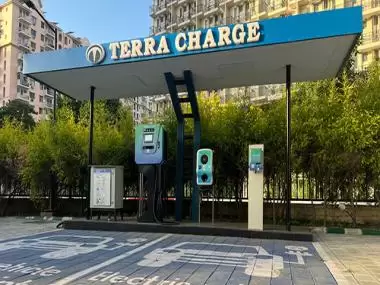Indian EV market crosses 1.5 mn units in 2023, seeks budgetary sparks for future growth
Share- Nishadil
- January 17, 2024
- 0 Comments
- 5 minutes read
- 131 Views

Indian EV market crosses 1.5 mn units in 2023, seeks budgetary sparks for future growth
Indian EV market crosses 1.5 mn units in 2023, seeks budgetary sparks for future growth
Business Indian EV market crosses 1.5 mn units in 2023, seeks budgetary sparks for future growth The EV sector seeks stability in policies and measures that would enable the industry to develop long term plans and attract investments through innovations and expansion Akihiro Ueda January 17, 2024 10:26:01 IST The EV sector in India needs a boost from the government The Indian electric vehicle sector marked a significant milestone in 2023 by clocking over 1.5 million unit sales, recording a 46 per cent Y o Y growth.
This feat is commendable, given the renewed efforts to curb fossil fuel usage and increase the EV adoption rate in the country to achieve 30% sales penetration for private EVs by 2030. Keeping these developments and growth in mind, the industry and its stakeholders are hoping for the upcoming Union Budget to make favourable announcements, with greater anticipation for more incentives to support the growth.
Some of the most popular expectations from the upcoming budget include: Updates on FAME II Related Articles Parliament Budget Session 2024 to be held from 31 Jan to 9 Feb; FM Sitharaman to present interim budget on 1 Feb China’s BYD to reward dealers with gifts worth 2 billion Yuan for hitting sales target, beating Tesla The government has recently indicated that the Indian EV market has reached a level of maturity that might not need a third phase of the Faster Adoption and Manufacturing of (Hybrid &) Electric Vehicles in India (FAME) scheme.
However, there are speculations that the government might extend the second phase of the subsidy scheme’s primary incentive for EV manufacturers in this upcoming budget, with additional allocation to expanding its funding. Regardless, it is safe to say that there could be potential updates on phase two of the scheme that could impact the EV sector’s fate significantly, at least in the short term.
Increased financial support Around 15,30,326 EVs were registered in India in 2023, up from the 10,25,134 units registered in 2022, marking a growth of 49.28 per cent. To further continue this growth momentum and accelerate the adoption rate of this green technology among consumers, the sector is hopeful for increased financial incentives from the upcoming budget.
Typically, favourable incentives, such as priority sector lending and government grants and a reduction in the rate of interest for retail customers, are anticipated changes to incentivize the masses to purchase EVs. Tax reforms In the previous budget, reducing customs duty, particularly on electric vehicle components, helped boost local manufacturing.
As a result, the industry is looking forward to tax reforms that would favor the sector’s growth. The industry hopes for some relief in GST rate cuts, particularly on EV batteries. This is because the batteries make up a large part of an EV’s upfront cost. A sharp reduction in the current 18 per cent GST on battery components could make the vehicles more affordable, boosting their overall sales and acceptance.
Similarly, reducing the cost will help manufacturers save more on their EV batteries and allocate the resources towards other aspects of their operations, including research and development to innovate product lines. Setting up an EV charging ecosystem The electric sector could also expect favourable measures to meet India’s gap in electric charging infrastructure.
As of 21 March 2023, there were 6,586 public EV charging hubs in the country, with only 419 operational charging stations across national highways. An allocation in the form of investments to set up fast charging corridors could help increase the current number of EV chargers across India and create rural charging solutions.
Besides these, more opportunities to collaborate with the central and state governments, tax breaks for EV charging station developers, and simplification of land acquisition processes to install charging stations are anticipated from the upcoming budget. Uniform standard for EV batteries The electric vehicle needs robust and uniform standards for battery swapping to address rampant issues such as safety, quality and range anxiety.
In this regard, the sector anticipates a national mandate to embrace global ISO standards under the nation’s Central Motor Vehicle Rules. Such a strategic move could ensure quality assurance and facilitate a seamless charging experience for EV riders. Above all, the EV sector seeks stability in policies and measures that would enable the industry to develop long term plans and attract investments through innovations and expansion.
The incentives discussed above could help power up the EV sector and accelerate the adoption rate in India. Given the government’s drive to phase out petrol and diesel run vehicles, there’s potential for favourable EV policies in the upcoming budget. The author is CEO, Terra Motors India. Views expressed in the above piece are personal and solely that of the author.
They do not necessarily reflect Firstpost’s views. Read all the Latest News , Trending News , Cricket News , Bollywood News , India News and Entertainment News here. Follow us on Facebook , Twitter and Instagram . Join our Whatsapp channel to get the latest global news updates Published on: January 17, 2024 10:24:40 IST TAGS: Battery Swapping Ev Fame Ii Union Budget.
Disclaimer: This article was generated in part using artificial intelligence and may contain errors or omissions. The content is provided for informational purposes only and does not constitute professional advice. We makes no representations or warranties regarding its accuracy, completeness, or reliability. Readers are advised to verify the information independently before relying on







